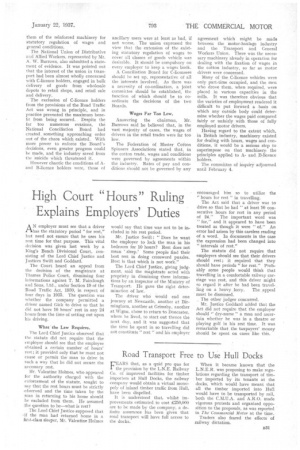High Court " Hours " Ruling Explains Employers' Duties
Page 41

If you've noticed an error in this article please click here to report it so we can fix it.
AN employer must see that a driver has the statutory period "for rest," but need not ensure that he uses his rest time for that purpose. This vital decision was given last week by a King's Bench Divisional Court, consisting of the Lord Chief justice and Justices Swift and Goddard.
The Court heard an appeal from the decision of the magistrate at Thames Police Court, dismissing four informations against T. M. Fairclough and Sons, Ltd., under Section 19 of the Road Traffic Act, 1930, in respect of four days in 1935. The question was whether the company permitted a driver named Gick to drive so that he did not have 10 hours' rest in any 24 hours-from the time of setting out upon his driving.
What the Law Requires.
The Lord Chief justice observed that the statute did not require that the employer should see that the employee obtained a certain number of hours' rest ; it provided only that he must not cause or permit the man to drive in such a way that he did not secure the necessary rest Mr. Valentine Holmes, who appeared for the authority charged with the enforcement of the statute, sought to say that the rest hours must be strictly .observed and the time taken by the man in returning to his home should be excluded from them. He assumed the question to be—what is rest?
The Lord Chief justice supposed that -if the man had returned home in a first-class sleeper, Mr, Valentine Holmes would say that time was not to be included in his rest period.
Mr. justice Swift: " Does he want the employer to lock the man in his bedroom for 10 hours? Rest does not mean ' sleep.' Some people find their best rest in doing crossword puzzles. Rest is that which is not work."
The Lord Chief Justice, giving judgment, said the magistrate acted with propriety in dismissing these informations by an inspector of the Ministry of Transport. He gave the right determination of law.
The driver who Would end one journey at Newcastle, another at Birmingham, another at Grimsby, another at Wigan, chose to return-to Doncaster, where he lived, to start out thence the next day, and it was suggested that the time he spent in so travelling did not constitute " rest " and his employer
encouraged him so to utilize the "hours for rest " in travelling.
The Act said that a driver was to drive so that he had " at least 10 consecutive hours for rest in any period of 24." The important word was "for," and it appeared to have been treated as though it were " of." An error had arisen by this careless reading of a word. In documents in the case the expression had been changed into "intervals of rest," The statute did not require that employers should see that their drivers should rest; it required that they should have periods for rest." Probably some people would think that travelling in a comfortable railway carriage was rest, and this driver might so regard it after he had been travel
ling on a heavy, lorry. The appeal must be dismissed.
The other judges concurred.
• Mr. justice Goddard added that the Act did not require that the employer should " dry-nurse " a man and ascertain whether he was in a theatre or playing golf in his rest time. It was remarkable that the taxpayers' money should be spent on cases like this.
















































































































